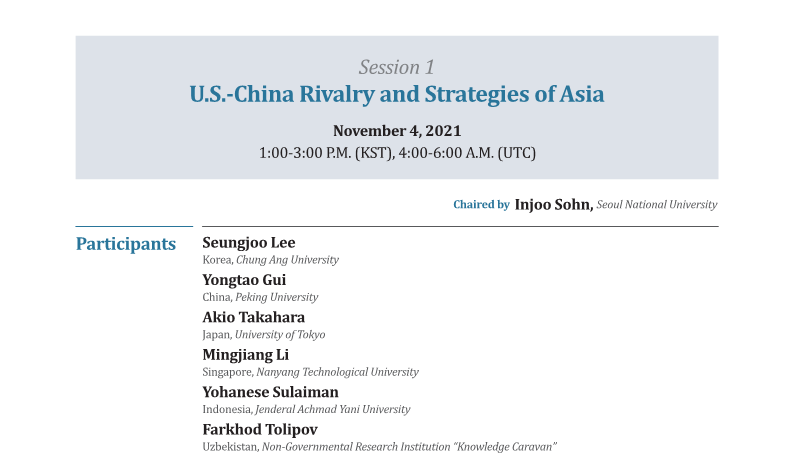
Session 1 examines the national strategies, policies and perceptions on the US-China rivalry
- How does each country perceive the rising tensions between the US and China?
- What concerns does each country have regarding the US-China contest for influence in Asia, and why?
- What roles does each country want China to play at a time of strategic rivalry between the US and China?
Chairperson
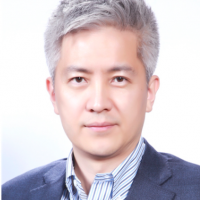
Injoo Sohn / Seoul National University / Korea
Injoo Sohn is a professor at the Department of Political Science and International Relations at Seoul National University. He also serves as the current Director for the Institute for China Studies at Seoul National University, and previously held the position of assistant/associate professor at The University of Hong Kong and Visiting Research Fellow at the Princeton Institute for International and Regional Studies. He holds a Ph.D. in Political Science from George Washington University. His recent publications include “Asymmetrical Fairness: China’s Use of Antidumping Measures” (2020); Regionalism as Financial Statecraft: Pursuit of Counterweight Strategies by China and Japan” (co-authored with Saori N. Katada) in L.E. Armijo and S.N. Katada (eds.) Financial Statecraft of Emerging Powers: Asia and Latin America in Comparative Perspective (2014). He is currently working on a single-authored book manuscript, Reflective State: China’s International Financial Statecraft in Comparative Perspective, 1927-1937 and 1997-2012 and manuscripts “The Logic of Asymmetrical Fairness: A Chinese Population-based Survey Experiment” and “Politics of Emotion in East Asia.”
Participants
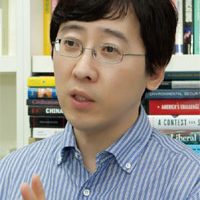
Seungjoo Lee / Chung Ang University, Professor / Korea
Seungjoo Lee is a professor at the Department of Political Science and International Relations at Chung-Ang University. Professor Lee received both his B.A. and M.A. from Yonsei University, and received his Ph.D. in Political Science from the University of California at Berkeley. He currently serves as the Chair of the Trade, Technology and Transportation Research Center at the East Asia Institute, Director of the Korean Political Science Association and Vice President of the Korean Association of International Studies. He has also served as a member of the Policy Consultation Committee at the Ministry of Foreign Affairs since 2018. His recent publications include “Economic-Security Nexus and the Evolutionary Dynamics of the U.S.-China Strategic Competition” (2021); “The Political Economy of China’s Rise in Space: A Nexus between Industrial Policy and the Belt and Road Initiative” (2021). His book Korea’s Middle Power Diplomacy: Between Power and Network is forthcoming. His areas of research interest cover the subjects of East Asian regionalism, global FTA networks, middle power diplomacy, and development cooperation.
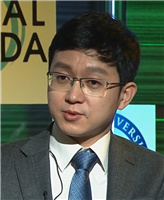
Yongtao Gui /Peking University, Associate professor / China
Yongtao Gui is the associate Dean and associate professor of the School of International Studies at Peking University, and the Vice President of the Institute of International and Strategic Studies at Peking University. His research fields include the international relations of East Asia, relations between the US, China and Japan, East Asian nationalism and East Asian security. He received his PhDs from Waseda University and Peking University in 2005 through a double-degree program. His research focuses on politics and international relations of East Asia. His recent publications include “Japan and the U.S.-China Strategic Competition: Trade War, Technology War, and the Indo-Pacific Strategy” (2020); “Competing in the Gray Zone: A New Situation in U.S.-Japan Engagement with China” (2019); “The Politics of TPP: The Motivation and Predicament of U.S.-Japan Cooperation” (2017); “Japanese Academia’s Changing Perceptions of the United States and Their Policy Conceptions” (2015); “The Rise of Nationalism in East Asia and the Changing Relations between China and its Neighbours” (2013) ; “China-Japan-US Relations and Northeast Asia’s Evolving Security Architecture” (2010).
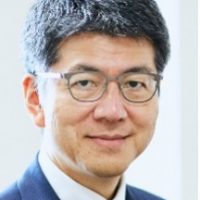
Akio Takahara / University of Tokyo, Professor / Japan
Akio Takahara is Professor of Contemporary Chinese Politics at the Graduate School of Law and Politics and the Graduate School of Public Policy (GraSPP) at The University of Tokyo. He received his DPhil in 1988 from Sussex University, and later spent several years as Visiting Scholar at the Consulate-General of Japan in Hong Kong, the Japanese Embassy in Beijing, Harvard University, Peking University, the Mercator Institute for China Studies, and at the Australian National University. Before joining The University of Tokyo, he taught at J. F. Oberlin University and Rikkyo University. He served as President of the Japan Association for Asian Studies, and as the Secretary General of the New Japan-China Friendship 21st Century Committee. Akio was Dean of GraSPP from 2018 to 2020. He currently serves as Senior Adjunct Fellow of the Japan Institute of International Affairs, Distinguished Research Fellow of the Japan Forum on International Relations, and Director of JICA Ogata Sadako Research Institute for Peace and Development. His publications in English include The Politics of Wage Policy in Post-Revolutionary China, (Macmillan, 1992), and Japan-China Relations in the Modern Era, (co-authored, Routledge, 2017).
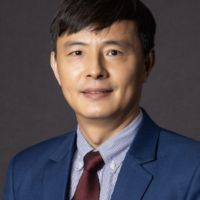
Mingjiang Li / Nanyang Technological University, RSIS, Associate professor / Singapore
Dr. Li Mingjiang is an Associate Professor and Provost Chair in International Relations at S. Rajaratnam School of International Studies (RSIS), Nanyang Technological University, Singapore. He is also the Coordinator of the PhD Program at RSIS. He received his Ph.D. in Political Science from Boston University. His main research interests include Chinese foreign policy, Chinese economic statecraft, the Belt and Road Initiative, Chinese politics, China-ASEAN relations, Sino-U.S. relations, and Asia-Pacific security. He is the author (including editor and co-editor) of 15 books. His recent books are China’s Economic Statecraft (World Scientific, 2017) and New Dynamics in US-China Relations: Contending for the Asia Pacific (lead editor, Routledge, 2014). He has published papers in various peer-reviewed outlets including International Affairs, Asian Perspective, Asian Politics & Policy, Asian Security, Oxford Bibliographies, Journal of Asian Security and International Affairs, Journal of Strategic Studies, Global Governance, Cold War History, Journal of Contemporary China, the Chinese Journal of International Politics, the Chinese Journal of Political Science, China: An International Journal, China Security, Harvard Asia Quarterly, Security Challenges, and the International Spectator.
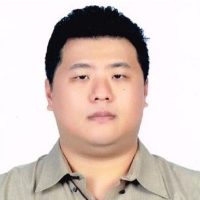
Yohanese Sulaiman / Jenderal Achmad Yani University, Lecturer / Indonesia
Yohanese Sulaiman is a Lecturer in the School of Government at Jenderal Achmad Yani University and a visiting lecturer at Universitas Pertahanan Indonesia (National Defense University). He received his Ph.D. in Political Science from the Ohio State University. He has previously served as the Director for the Center for Democracy, Integrated Peace and Security Studies, and as special staff for the Secretariat for the Coordinating Ministry for Politics, Law, and Security. He currently serves as the executive editor for the Journal of Global Strategic Studies. His recent publications include “Indonesia Between United States and China in Post-Covid-19 Bipolar World Order” (2021); “What Threat? Leadership, Strategic Culture, and Indonesian Foreign Policy in South China Sea” (2019); “Underbalancing the Dragon: Unstrategic Indonesia,” in D. K. Emmerson (ed.) The Deer and the Dragon: Southeast Asia and China in the 21st Century (2020); Ocean Crossings with a Dragon: The Synergy between the Global Maritime Nexus and the 21st Century Maritime Silk Road (2016).
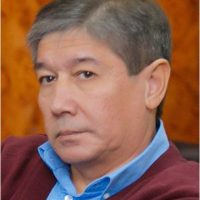
Farkhod Tolipov / Non-Governmental Research Institution “Knowledge Caravan”, Director / Uzbekistan
Farkhod Tolipov is the Director of the research institution “Bilim Karvoni,” an NGO based in Tashkent, Uzbekistan. He also serves as an adjunct professor at the Webster University in Tashkent and adjunct professor at the Akhmet Yaasuwi University in Turkestan. He is currently on the editorial board of the journal Central Asia and Caucasus and is a member of the Central Eurasian Studies Society. He previously held the position of associate professor at the Department of Political Science, The National University of Uzbekistan and research fellow at the Davis Center for Russian and Eurasian Studies at Harvard University. He received his Ph.D. in Political Science from the University of World Economy and Diplomacy, Tashkent. His recent publications include “Spirit and Letter of Strategic Partnership of India and Uzbekistan”, in D. Nandy (ed) Connecting Asia Understanding Foreign Relations, Organizations and Contemporary Issues (2020), Detecting Power in Power Projection: The Case of Uzbekistan (2019), His current research is on the topic ‘How to Define National Interests?”
